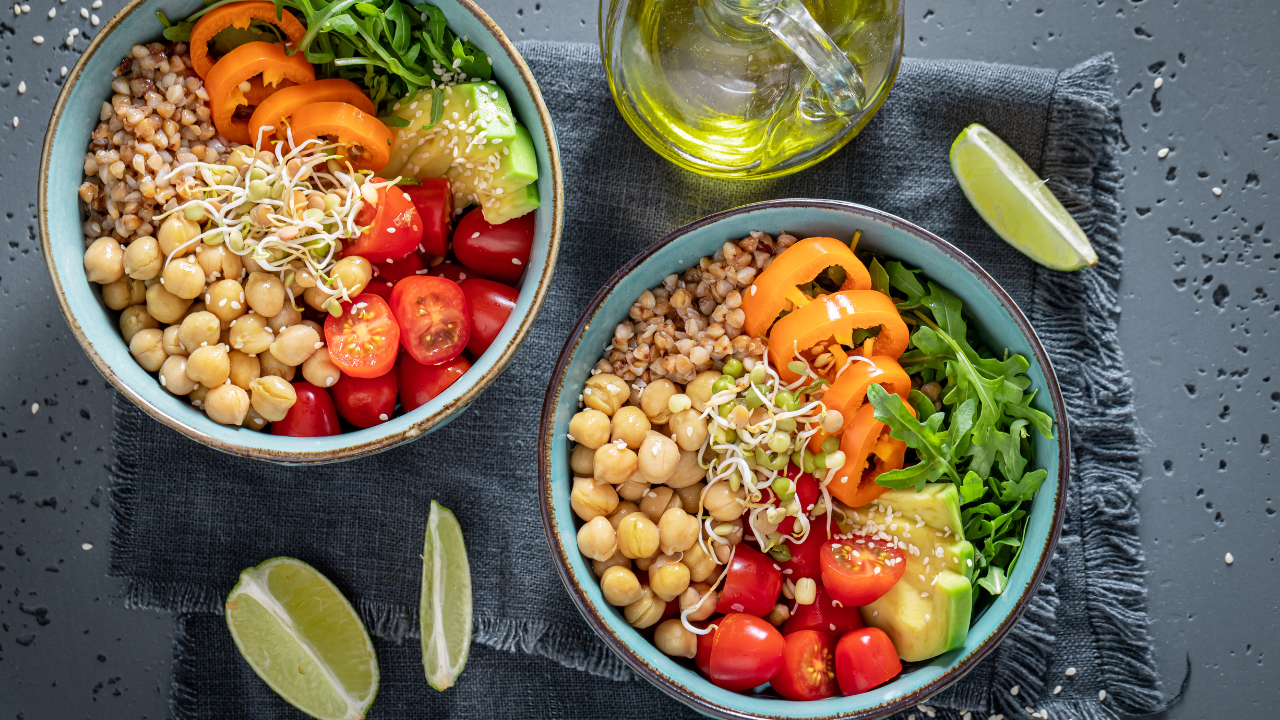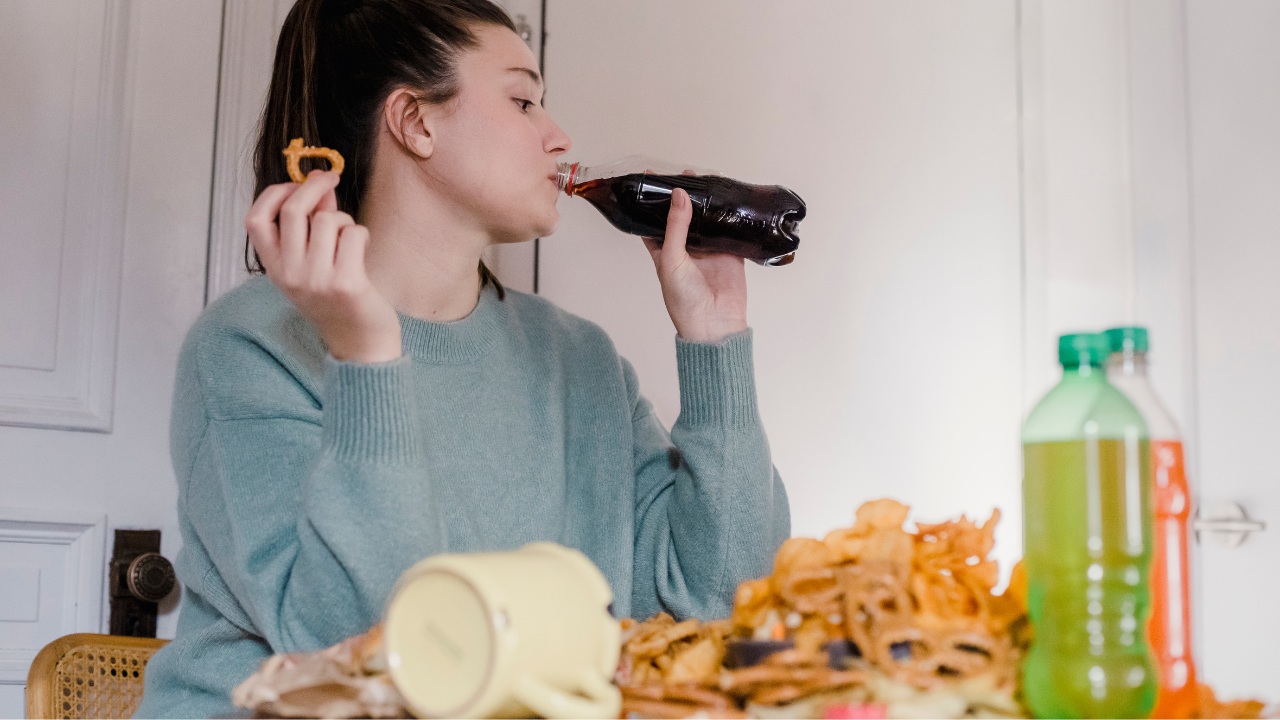Managing Your IBS with Intuitive Eating
If you have irritable bowel syndrome (IBS), you may have been told to follow a diet to treat this condition. Unfortunately, restrictive dieting is unsustainable and only tends to make IBS (and other health conditions) worse. So if dieting isn’t the solution to managing your IBS, what is?
If you’re new here, hello and welcome! My name is Hannah and I am a non-diet dietitian here to help you improve your relationship with your food and exercise and finally find food freedom.
Nutrition and exercise can play a key part in the and treatment of chronic conditions such as IBS. However, we want to avoid getting caught up in food restriction and strict rules.
In this blog, we will discuss how to apply the principles of intuitive eating for a non-diet approach to treating IBS.
Table of contents:
What is IBS?
Irritable bowel syndrome (IBS) is a chronic gastrointestinal disorder that can cause uncomfortable symptoms such as abdominal pain, bloating, gas, diarrhea and/or constipation.
There are three main types of IBS. IBS-C is diagnosed when constipation is predominant while IBS-D is diagnosed when diarrhea is predominant. IBS-M can be diagnosed when symptoms are mixed and there are alternating episodes of constipation and diarrhea.
IBS does not have a single cause and it can by triggered by a variety of factors including food intolerances, dietary patterns, endometriosis, bacterial infections, medications, and psychological stress and anxiety.
How is IBS treated?
IBS treatment is individualized - each person’s treatment plan is different. There is no cure for IBS and treatment typically involves symptom management and prevention.
Nutrition interventions for IBS may involve adjusting meal timing and meal size, increasing or decreasing fiber intake, and identifying fluid needs. Some individuals may find that they need to limit their intake of acidic or spicy foods, caffeine, or lactose (lactose intolerance is quite common). However, these foods will not all be triggers for every person with IBS.
Adjustments of exercise type, frequency, and intensity may also be considered. Physical activity may aid in more regular bowel movements, but too much movement can make IBS symptoms worse. It’s a tricky balance!
Some individuals may choose to take medications for IBS treatment. There is no shame in this! You may do everything “right” when it comes to diet and exercise and still require a medication to manage your IBS. There are so many factors that affect IBS beyond just food choices and physical activity and our health is not totally in our control! Your doctor can help you decide if medication is a good treatment option for you. If you have a history of disordered eating or eating disorders, laxatives may need to be avoided or only used with close supervision.
Why diets don’t work for treating IBS
Unfortunately, a list of foods to avoid via an elimination diet often accompanies an IBS diagnosis. Sometimes these diet recommendations will even come from people who are not qualified to provide nutrition education. When it comes to IBS and gut health, there is so much misinformation out there.
While following an elimination diet may provide some symptom relief in the short term, these diets are often not sustainable. I like to remind people that an elimination diet should always include a reintroduction phase to ensure that people are not avoiding foods that are not even triggers for them.
Even if an elimination diet is evidence based and is providing IBS symptom relief, such restriction can be risky. Following a diet with strict rules is often a one-way ticket to disordered eating. You might find that even though you are experiencing some symptom relief, the strict dieting has resulted in food obsession, worsened body image, and/or binge-type eating.
Undereating is also a very common trigger for IBS symptoms. I have worked with many people with IBS who have found a great deal of symptom relief simply by increasing their overall food intake. In this way, dieting can very well make your IBS worse!
All this said, if you have tried treating your IBS by going on a diet and it did not work for you, do not blame yourself. You are not the problem. Diets have an astronomically high failure rate, yet we continue to blame the struggle to “stick with it” on lack of motivation or willpower.
Does the low FODMAP diet work for IBS?
The low FODMAP diet is an elimination-reintroduction diet that involves temporarily eliminating foods with highly fermentable carbohydrates (i.e. FODMAPs). These types of carbohydrates produce a lot of gas in the gut when they are broken down and those with IBS may be more sensitive or experience negative symptoms in response.
A low FODMAP diet typically does provide short-term relief for those with IBS. It is not recommended to avoid high-FODMAP foods forever, though. Avoidance of all FODMAPs may actually make IBS worse by altering the gut microbiome. It is strongly encouraged to follow a low FODMAP diet with the support of a registered dietitian who can help you navigate the initial elimination phase as well as the reintroduction of FODMAP-containing foods.
The low FODMAP diet is generally not recommended for those with disordered eating or eating disorders, as the elimination phase can make disordered eating behaviors worse and possibly worsen digestion. Remember, undereating is a huge trigger for IBS symptoms.
People with disordered eating may find it difficult to reintroduce FODMAP containing foods, even if the elimination diet is no longer providing relief. The low FODMAP diet tends to be a last resort for those with disordered eating, even if they are working closely with a dietitian who can provide support. Chances are, there are many other nutrition strategies that can be implemented that will not involve strict elimination.
Are food sensitivity tests accurate?
Some individuals will decide which foods to eliminate from their diet by utilizing a food sensitivity test. Food sensitivity testing has grown in popularity and test kits can even be purchased for at-home testing. This sounds great in theory, but food sensitivity tests may actually result in its users removing foods that they are not truly sensitive to.
The most common food sensitivity test is an IgG test, which measures how much IgG (a type of antibody) is released when the blood is exposed to a certain food. In other words, IgG tests simply indicate exposure to a food. Many people who try IgG food testing find that they are “sensitive” to all the foods that they regularly eat. But this is simply a normal response to exposure of those foods, not an indication of intolerance. In fact, higher levels of IgG4 to foods may simply be associated with tolerance to those foods.
Food intolerances are uncomfortable at best and dangerous at their worst, so it is understandable why people are interested in participating in food sensitivity testing. But unfortunately, there is no single test that can tell you exactly which foods to avoid.
Want to learn more? We discussed this topic in more detail with an IBS dietitian in this podcast episode.
What is intuitive eating?
Intuitive eating is a non-diet approach to eating that was developed by two registered dietitians, Evelyn Tribole and Elyse Resch. There are 10 principles of intuitive eating with a goal of helping you improve your relationship with food and your body.
Reject the diet mentality
Honor your hunger
Make peace with food
Challenge the food police
Discover the satisfaction factor
Feel your fullness
Cope with your emotions with kindness
Respect your body
Movement - feel the difference
Honor your health - gentle nutrition
If you are new to intuitive eating and looking to learn more, check out my ultimate beginner’s guide.
How to manage IBS with intuitive eating
Intuitive eating is one way to manage your IBS without following a strict diet. There are ten total principles of intuitive eating and I recommend reading this post to learn more about how intuitive eating can be used to treat chronic conditions as a whole.
Many people believe that intuitive eating can not be utilized for those with IBS. This makes sense - an IBS diagnosis often comes with a list of foods to avoid, which is not exactly conducive to the anti-diet lifestyle.
The main principle I want to focus on for IBS treatment is the principle of gentle nutrition. Gentle nutrition is essentially the intersection between fueling your body with the nutrients it needs while also eating foods that you want and enjoy. There are various ways that gentle nutrition can be used to treat IBS, which we will discuss below.
Eat consistently
A chaotic, inconsistent eating schedule can be a culprit of IBS symptoms. Going long periods without eating followed by eating larger amounts of food can cause a lot of gut distress. You may find that sticking to a routine eating schedule helps manage symptoms and you may even be able to enjoy foods that you used to feel you were intolerant to.
There is no need to be strict with your meal timing, although I generally recommend trying to eat every 3-4 hours or so. This is not a rule, as some people may benefit from eating more frequently and others may do okay going longer periods without a meal or snack.
Eat balanced meals
A “balanced” meal includes a source of protein, carbohydrates, and fats. While not every meal will be perfectly “balanced”, incorporating these macronutrients helps your body to know what to expect.
Each of the macronutrients (protein, carbohydrates, and fats) also stimulates the release of different digestive enzymes. Inadequate or excessive intake of any of these nutrients can cause digestive distress.
Related post: How to Choose What to Eat With No Food Rules
Hydrate
Don’t skip over this one! Fluids play a huge role in digestion. Drinking plenty of fluids can aid in the treatment of constipation and make your bowel movements easier to pass. If you have chronic diarrhea, be sure to drink enough to prevent dehydration.
While water is a great way to hydrate, other fluids and even foods with a high fluid content can help you to hydrate.
Limit alcohol
While small to moderate amounts of alcohol may not trigger IBS symptoms, larger quantities can irritate the gut and lead to flare-ups of IBS symptoms. Long term alcohol use can also alter the gut’s motility, permeability, and reduce nutrient absorption.
If you have IBS, you may find that certain types of alcohol are more tolerable than others. At the end of the day, alcohol will never be health promoting, and it is absolutely okay to choose to drink less or not at all.
Related post: Intuitive Drinking - How Alcohol May Fit Into Your Food Freedom Journey
Try fermented foods
Fermented foods such as kimchi, yogurt, miso, and kefir are a source of probiotics, which can support digestive health. For some, eating fermented foods may support a healthy and active gut microbiome but for others can cause bloating and gas. Perhaps try some fermented foods along with other therapeutic strategies to see what works best for you.
Incorporate joyful movement
Exercise may be beneficial for treating IBS, but more is not necessarily better. Intense, sustained exercise may actually worsen IBS by directing blood flow away from the gut. Overcoming chronic overexercising will likely make a huge difference in your gastrointestinal symptoms.
Joyful movement is the key here. There is no place for using exercise as punishment or as a way to “make up” for what you ate the day before. Gentle movement may be better tolerated than vigorous activity.
Monitor without judgement
Intuitive eating involves getting curious about how different foods affect you and make you feel. This will allow you to engage with food without judgement and fear and instead help you to build trust and respect for your body.
Be objective about how a food impacts your energy levels, satisfaction, and IBS symptoms. Remember that these are just data points. Your signs and symptoms just give you a glimpse of what is happening inside your body. It is not a reflection of how "good" or "bad" you are as a person. You can then use this data to help you make future decisions.
Practice good sleep hygiene
If you haven’t noticed, sleep impacts pretty much every part of our biology, and our gut is definitely included. There are many factors that can make it difficult to get good sleep, so I know that this can be easier said than down. That said, practicing good sleep hygiene may be just as important as making diet and exercise changes.
Try to go to bed at the same time each night, allow for enough time to sleep, be mindful of screen time, and consider if caffeine use is impacting your sleep quality.
Consider methods of anxiety management
There is a very strong connection between the brain and the gut. Not only are mood disorders more common in people with IBS, these conditions can make IBS worse. It’s sort of like the chicken and the egg thing - hard to tell if the anxiety or IBS came first.
Put simply, when the brain feels stress and anxiety, our bowel habits can change. And when bowel habits change, this can cause us to feel stress and anxiety.
Anxiety management looks different for everyone. Some people find relaxing activities such as journaling, reading, and drawing and painting to be helpful. Others find that regular gentle movement helps keep their anxiety at bay. Many people utilize medications to treat their mood disorder. If you have access to mental health therapy, this would be a great place to start.
How can a dietitian help with treating IBS?
Registered dietitians can help you to manage your IBS by providing guidance and support on managing your symptoms. You can work with me by joining my signature program to learn more able implementing gentle nutrition to improve your health without dieting.
Bottom line - does intuitive eating work for IBS?
Yes, intuitive eating may be a beneficial approach for those with IBS. Intuitive eating looks different for everyone and people with IBS may practice intuitive eating differently than those without, but this does not mean that a non-diet approach is not possible.
Restrictive dieting is a common risk factor for IBS. Ditching the diets and eating enough may be a great first step in finding IBS relief.
Disclaimer: this post is for informational and educational purposes only and is not a substitute for professional medical advice.
Follow along
Featured videos
Want more help on your diet ditching journey?
Join my signature membership to become part of a community of ex-dieters working towards food freedom and making peace with food so they no longer need to cut out their favorite foods.





































